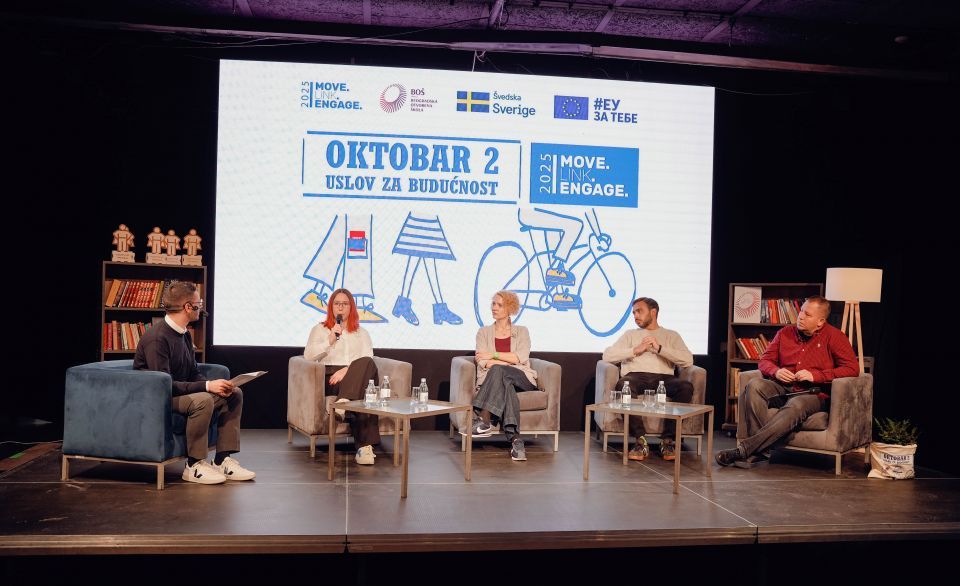Within the framework of the twelfth Move.Link.Engage conference, titled “October II: A Second Chance for the Future,” dedicated to youth as examples of civic activism, gathered students, young people, activists, experts and many others got insight into current developments and the impact of social changes on citizens’ daily life, civic organizing, obstacles and lessons learned, as well as perspectives of Serbia’s EU membership.
At the conference, Ela Zeković, a student at the Faculty of Political Sciences and alumna of BOS Future Studies program, spoke, reflecting on nearly a year of continuous protests and the role played by youth. “In recent months, it has been exhausting to be young in Serbia, but at the same time inspiring, because the changes we are making are very important for society as a whole. And it is also important that people are finally becoming aware of what politics is in essence. That it is not only acting through parties and NGOs, but also a way for us ourselves to take responsibility and create the society we want,” emphasized Zeković, adding that broader citizen organization and dialogue are necessary for change. “In terms of values, a broader discussion and exchange of opinions are needed, rather than having only one side impose viewpoints. Students, with their actions and by calling on citizens, open space for pluralism of thought and debate.”
That students and youth are redefining and revitalizing civic activism is also the belief of Professor Dušan Spasojević from the Faculty of Political Sciences, who concludes that young people no longer see politics as something pejorative, but understand its importance and the significance of engagement, and that it is only a matter of time before they gain a greater role in society. “It is important to think and talk about political conditions, and students have enabled people to enter the public sphere and speak about important things. An environment has been created that gives room for optimism and belief that something can really be changed here,” said Spasojević, adding that there is continuity in youth engagement, but now it is growing and reaching a peak.
Serbia’s EU Perspective: How Close Are We to Membership?
Research by the National Youth Council of Serbia shows that nearly 75% of youth believe Serbia has still not joined the Union because it does not fulfill the criteria of democracy and rule of law, while 43% of youth support Serbia’s entry into the European Union.
Paul Collins, First Secretary and Programme Manager for Environment and Climate Reform Support at the Embassy of Sweden in Belgrade, said: “Supporting initiatives led by youth, civil society and independent media for us is not only an obligation but also an expression of the belief that a strong democracy depends on active, informed and empowered citizens. Today's discussion gives voice to youth and helps us to hear them, better understand what they want, what challenges they face, and what their ambitions are. We believe democracy is strongest when everyone participates, not only through elections but also in everyday decision-making.”
Addressing those present was also Milorad Bjeletić, Executive Director of the Belgrade Open School, who emphasized that BOS has been initiating significant topics, placing students and youth at the center of its work, for over 30 years. He added that it is important to exchange experiences and apply lessons learned. “We know democracy is perishable, not only in Serbia but in the rest of the world, and that we must fight for those values daily, because if people are not engaged, things can go in the wrong direction. The Belgrade Open School continues to do what it has always done — to provide a space for conversation about values, organize trainings and build capacities of civil society,” said Bjeletić.
Media Literacy and Mutual Support as Conditions for Youth Organization
An integral part of this event were thematic workshops: MOVE, where the key focus was media literacy and the application of creative formats and digital tools through which youth themselves create new media space; LINK, with emphasis on psychological mutual support and balance between civic activism and individual care, as well as challenges young people face in their social engagement; and ENGAGE, where discussions were held on various models of civic self-organization and models of their functioning.
This year’s twelfth Move.Link.Engage conference was organized by the Belgrade Open School and with the support of the Delegation of the European Union in Serbia and the Embassy of Sweden in Belgrade, within the projects “EU National Resource Center for Civil Society in Serbia” and “Civil Society Advancing Serbia’s EU Accession Process: Europe ASAP.”
Source of photographs: Tamara Umićević / BOS
